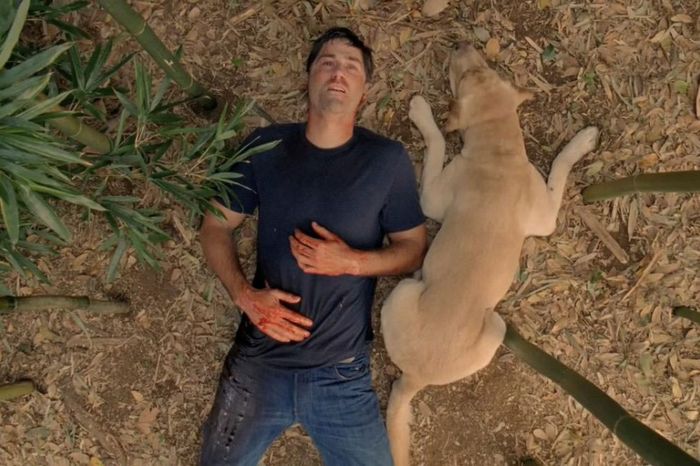
The most predictable thing about the Game of Thrones finale was the rage that consumed Twitter as soon as it was over. At least in my timeline, everyone immediately started laying waste to the ending as if they were Drogon unleashing hellfire on the people of King’s Landing. Phrases like “I wasted eight years of my life” and “ruined the whole series” were common refrains. So was the word “sucked.”
In general, TV critics and writers have not been much warmer. The Rotten Tomatoes scores went from fresh for the first three episodes of the season to a trio of splats; more than half of the included critics gave the finale a negative review.
“Game of Thrones itself unwittingly became the victim of an ironic and agonizingly protracted Game of Thrones ending,” wrote our Matt Zoller Seitz.
“Tonally odd, logically strained, and emotionally thin, ‘The Iron Throne’ felt like the first draft of a finale,” said Spencer Kornhaber in a roundtable discussion about the episode for The Atlantic.
“The kindest thing I can say about the Games of Thrones series finale,” offered Time critic Judy Berman, “is that it might have satisfied Plato.” Even Senator Kirsten Gillibrand is super pissed-off.
The disappointment and outright resentment about the end of Game of Thrones feels bigger and sounds louder than anything we’ve heard about a TV finale in years, because there hasn’t been a show this big and loud in years. Game of Thrones became a phenomenon on par with Star Wars or The Lord of the Rings. On Sunday night, 19.3 million people tuned in to find out how it would end. It even inspired its own brand of Oreos. Oreos, for God’s sake!
The last time a TV finale spawned backlash this strong, in volume and sheer force of opinion, was nine years ago when Lost ended. There are a lot of similarities between the two shows in terms of what’s driving the complaints, specifically frustrations with holes in logic and/or unanswered questions. On Game of Thrones, if Bran can see all things, why didn’t he see what Daenerys was going to do in King’s Landing and warn Jon so she could be stopped? What is the point of being all-knowing if you don’t share your knowledge? And while we’re at it, what is the point of the Night’s Watch now that the Night King and White Walkers are dead? And why did Drogon melt the Iron Throne instead of burning Jon Snow to death for killing Daenerys? (Symbolism. The answer to that question is symbolism.)
These are good questions, and reminiscent of what drove viewers nuts after Lost aired its last episode. (Walt, like Bran Stark, was a young man who seemed to have special powers. But why?! I still want to know.) Lost fans were even more confused about some of the basics than Game of Thrones fans were, leading to extended arguments about whether everyone on the island was really in purgatory the whole time. (They were not in purgatory. Lost co-creators Damon Lindelof and Carlton Cuse had always said they were not in purgatory. Here’s Lindelof, four years after the finale, once again explaining that it was not purgatory. But I guarantee you that at some point, when this show comes up in casual conversation, some random acquaintance will say to me, “Wait, they were all in purgatory, right?”)
Others accused both Game of Thrones and Lost of getting too hokey. The former, for some, got too cornball with its meta Song of Ice and Fire book and that Brienne moment where she finished writing Jaime’s history, one of too many instances where that warrior of a woman was defined by her relationship to the Kingslayer. Lost, which reunited all the Oceanic 815 survivors in a multi-faith afterlife church, was even more explicitly sentimental in its conclusion, though that didn’t seem particularly out of character for the series.
In the finales of both shows, heroes with the initials J.S. — Jon Snow and Jack Shepherd — were reunited with their furry friends after making sacrifices for the greater good. Everyone could agree, at least, that the direwolf and the dog were great. But just as soon as Lost wrapped things up on a Sunday night back in May 2010, people were screaming that they had been robbed of the ending they deserved.
For shows that are so ambitious and serialized and epic in scope, it’s difficult to create a finale that’s going to please everyone. Not impossible, but certainly difficult. I would argue that Game of Thrones had an easier shot at pulling that off because they the show was being made on HBO in 2019, a time when creators — especially guys who sparked a pop-culture phenomenon the way David Benioff and D.B. Weiss helped to do — are given a lot more artistic freedom than Lindelof and Cuse would have had working in network television in the 2000s. Lost was also created with no blueprint, as opposed to a book series to build upon, and the demand to produce far more episodes of television than Game of Thrones had to create. (There were 121 of the former, and 73 of the latter.)
What I’m saying is that, if forced to choose, I would pick the Lost finale as the better of the two, despite its flaws, although, full disclosure, I was always more emotionally invested in that series than I ever was in Game of Thrones. But my larger point is that neither of them are the unmitigated disaster that some people have made them out to be. The most egregious error that Game of Thrones made in its closing stretch was mishandling Daenerys Targaryen’s arc: While she had committed violent acts in the past, it was extremely important to persuade the audience that, despite the promises she had made about how she would handle the attack on King’s Landing, she would suddenly snap and wipe out thousands of innocent people. Despite Emilia Clarke’s best efforts, the show failed to trace that emotional journey in a way that made us believe that, at this stage, she would engage in such unnecessary mass murder.
That all happened in the penultimate episode, so to enjoy the finale, you had to accept that flaw and try to appreciate what the show was still doing well, which is not an easy thing to do. That said, there was plenty left to admire. Peter Dinklage, the actor given the most to do in “The Iron Throne,” was superb. Benioff and Weiss, who had never co-directed an episode before now, made some striking visual choices, including that all-timer of Daenerys striding forward as the wings of Drogo unfurled behind her. The moment when Jon stabs Dany was a shock, and up until the second that Bran was named Lord of the Six Kingdoms, I had no idea what was going to happen next. Truly terrible television doesn’t deliver that much good stuff. Great television with noticeable flaws does, though.
You may not agree with me. And that’s more than fine. Many of the criticisms about “The Iron Throne” are perfectly valid. My concern about the rabid nature of the anti–Game of Thrones finale movement, which echoes the Lost backlash, is that it overemphasizes the importance of an ending. Everyone wants stories they enjoy to solidly land all their wheels on the runway and glide to a satisfying stop. But the last moment is not the only one that matters. If you enjoyed most of Game of Thrones up until this past season, then you didn’t waste eight years of your life watching it. It just didn’t end the way you wanted it to. Frankly, that is not a TV show’s job.
A TV show’s job is to move you and transport you and make you believe in the world and characters it has built. Game of Thrones definitely struggled on that last front in its eighth season, but that shouldn’t negate what it accomplished and how enthralling it was for so many years.
The same is true for Lost, which has become synonymous with the term “bad finale” in the nine years since it signed off, which is simply not fair. For starters, if you go back and look at some of the reviews, you may be surprised to learn that many are not nearly as scathing as you might expect given the finale’s reputation. (One example from James Poniewozik, now of the New York Times, but then writing for Time: “‘The End’ was an epic, stirring two and a half hours of television, full of heart and commitment, that was true to Lost’s characters as we knew them from season one.”)
More to the point, it’s inadequate to judge an entire TV show on its last episodes. To consider shows like Lost or Game of Thrones — both of which raised the bar for the scope and scale of television storytelling — solely on the quality of their finales is like assessing the value of a Shakespeare play based on its last page or the quality of Anna Karenina solely on the part where Anna throws herself in front of the train. (“Too depressing. No stars.”) Both of these shows were larger in terms of storytelling — we’re talking the number of characters, the backstories, the special effects, the budgets — than anything else on the air when they debuted. To reduce either one to a bad finale or a bad season is, well, reductive, especially for series that are so deliberately sprawling.
That’s another thing: Our view of how effectively a piece of pop culture achieves what it’s set out to achieve can shift, positively or negatively, as time progresses. But we’re so conditioned to have knee-jerk responses to every blessed thing that we form quick opinions, and then, sometimes, we stubbornly cling to them. When those opinions harden into an overall reputation, that doesn’t fully capture what a show meant or what it did.
By all means, keep talking about what you loved or hated about Game of Thrones. But also, try letting a finale sit in your brain and heart for a while — even, like, two minutes — and see if you feel any differently. You may hate it even more the longer you process it. Or you might recognize something of value that tempers your tilt toward the negative.
At the end of “The Iron Throne,” when Jon asks Tyrion if he thinks they were right to kill Daenerys, Tyrion responds: “Ask me again in ten years.” That’s good advice when it comes to series finales, too. Did I like the last episode of Games of Thrones? I had very low expectations, so yes, it was better than I thought it would be. But do me a favor: Ask me again in ten years.






